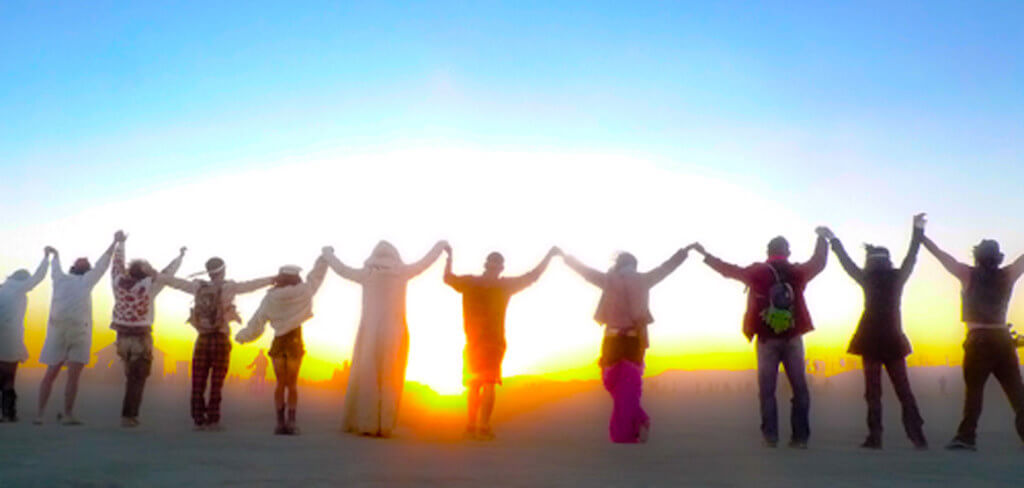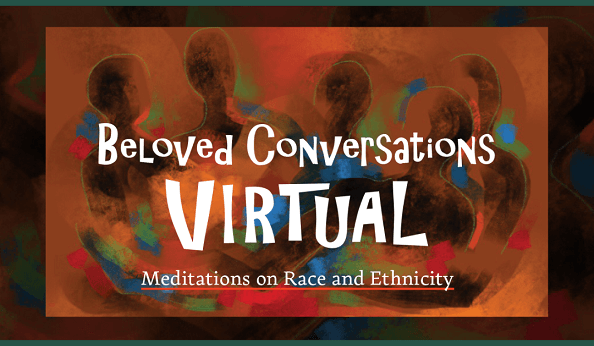By Audrey Lyness and Vilma Ortiz
In April, the Right Relations Team and Support convened to consult on a survey, developed by Vilma Ortiz, to assess the congregation’s response to right relations processes over the past few years. In May and June, the survey was publicized by word of mouth, flyers, email announcements, and in the order of service, and administered via a Google document and paper survey. People who were unfamiliar with or had stated negative opinions of right relations were encouraged to offer feedback. The approximately 70 individuals who chose to respond to the survey tended to be more familiar with the right relations endeavors, more likely to attend services, more involved in church activities and more likely to have held leadership roles. Accordingly, the survey results are not representative of the attitudes of all church members. Copies of the survey results (with graphs!) are available at the Right Relations Table.
The respondents are divided roughly evenly between those who have been members for fewer than six years, between six and 15 years, between 16 and 25 years, and more than 25 years. Similarly, the group is evenly divided between participating in a (non-Sunday service) church activity fewer than or once per month, two to three times per month, and once a week or more. Almost 50% of the respondents attend services every Sunday, almost 50% are involved in two to three committees, and more than 50% have chaired committees. The majority of respondents are between the ages of 60 and 80. Most of the respondents do not currently have young children, most are racially white, 2/3 of them have post-graduate degrees, 2/3 are homeowners and 60% are women.
Most survey participants responded positively about the right relations effort. 46% said they were positive, 25% were very positive and only 3% were negative. Similarly, church members felt that the right relations efforts were useful: 36% moderately useful, 43% very useful and 21% minimally useful.
When asked about their familiarity with right relations efforts, more than 70% of the respondents were familiar or very familiar; 16% attended no events, 35% attended one or two events, 29% attended three to five events, and 20% attended more. Of the respondents, 27% believe right relations efforts should cease and 72% recommend that the efforts continue – with one quarter of this group suggesting decreasing, one quarter increasing, and half urging maintaining the same activity level.
Respondents were asked to check off all listed feelings that apply; 30 responses included uncomfortable, bored, uninformed or “other,” 17 were enthusiastic, 20 were curious, 33 were supportive, and 39 were hopeful. Interest in participation in right relations activities was roughly evenly split between not, somewhat, interested and very, with the largest number somewhat interested and the fewest very interested.
A few respondents reported negative experiences: in early listening circles they felt precluded from expressing painful feelings, which exacerbated their sadness and/or anger; they believe right relations process has covered up rather than revealed or addressed real divisions; they believe that the process has gone on too long; that members and leadership are not living out the covenant, or that they use the covenant to police others.
Many respondents appreciated: sharing feelings honestly in the supportive space of listening circles; improved communication and reduced tension among congregants; the modeling of covenantal behaviors; support in working through interpersonal conflict; the hard work, support and caring shown by volunteers; increased respect, trust and relatedness within community; and our Covenant.
Respondents had concerns that: the process is not sufficiently far-reaching to impact those feeling judgment and distrust; there are conflicts of interest among leaders; the process did not start soon enough to address conflicts with the minister; the process is not tailored to individual needs; it has not proven transformative; we should focus on the future not the past; people need to be more friendly and forgiving; the quality of the work was disappointing, too limited in scope and fragmented; members who avoid the events are the ones who would most benefit from them; we should be challenging ourselves with more complex topics; and the church still has a way to go in respecting diverse opinions.
Respondents found the following to be helpful: skills building workshops; voicing and respecting opposing opinions in the protective space of listening circles; process observation at Board Meetings; developing our Covenant; sharing stories of meaning and transformation; facilitated dialogues; getting members involved with, talking to and learning about each other; and right relations as a vehicle for connection in healing and growth.
When asked what endeavors they would like to see in addition to existing circles, dialogues and workshops, respondents offered: book discussion groups, anti-racism and anti-sexism programming, pair-shares, ongoing groups for discussion of church-wide concerns, conflict resolution, competitive debate, brief inter-service discussions to share how we are living out or are having trouble living into the Covenant, video testimonials to inform the skeptical, and right relations as a regular agenda topic at Board meetings.
Regarding the Covenant, some feel it is not necessary, overly wordy and/or vague, difficult to implement, and that members lack commitment to follow its exhortations and won’t change behaviors. In contrast, many take pride in church members’ collective effort to develop it, believe that it accurately reflects who we are and should be, have found it useful in resolving conflict within and without the church, view it as an anchor from which to bring alive our values in and out of meetings, and find it a touchstone for healthier interactions.
Right Relations Team and Support are very grateful to everyone who took the time and effort to complete this survey. Thank you for your thoughtful responses!!




